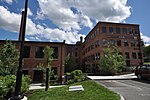Taconic Golf Club
1896 establishments in MassachusettsBuildings and structures in Berkshire County, MassachusettsCollege golf clubs and courses in the United StatesGolf clubs and courses in MassachusettsSports in Berkshire County, Massachusetts ... and 2 more
Tourist attractions in Berkshire County, MassachusettsWilliams Ephs
Taconic Golf Club is a semi-private golf course located in Williamstown, Massachusetts. The land that Taconic Golf Club is owned by Williams College, but an independent Board of Directors oversees the daily operation. The course has repeatedly made Golf Magazine's list of the Top 100 Courses You Can Play and Golfweek's list of top collegiate campus courses, where it was most recently ranked 3rd in 2020. Golf Digest ranks Taconic as the 9th best course in the state of Massachusetts.
Excerpt from the Wikipedia article Taconic Golf Club (License: CC BY-SA 3.0, Authors).Taconic Golf Club
Meacham Street,
Geographical coordinates (GPS) Address External links Nearby Places Show on map
Geographical coordinates (GPS)
| Latitude | Longitude |
|---|---|
| N 42.705503 ° | E -73.201863 ° |
Address
Williams College Taconic Golf Course
Meacham Street
01267
Massachusetts, United States
Open on Google Maps









